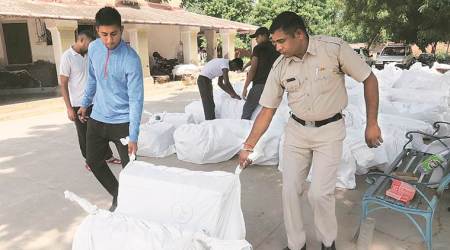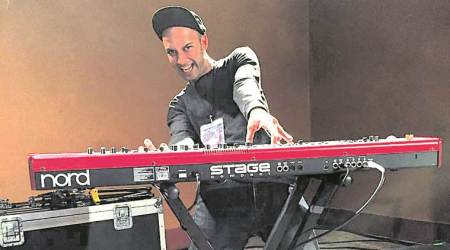 The cleaners are part of a contract agency named Krystal. (Express Photo)
The cleaners are part of a contract agency named Krystal. (Express Photo)
As the hustle and bustle of commuters on the Central Railway section of Dadar station winds down, the familiar sound of a jhadoo (broom) can be heard at all platforms, as men in blue uniforms just get to work. Reaching the station at 11 pm every night, they work into the morning and finish by 7 am to ensure that the station, one of the busiest in the city, is clean enough for the next day.
Mahendra Madhukarjaktam, 37, has been the cleaning supervisor of the station for six years. “The night shift involves a lot more work as the station is empty for most of these hours and the deep cleaning of the station is done in this shift, where not just the platforms but also the tracks, gutters, railway and police offices and the surrounding areas are all cleaned,” he said.
He added, “I give directions to the workers and patrol each platform three to four times. The workers have a combination of jobs and get a 30-minute break in between to rest. In fact, my job is very tough, as I have to maintain a higher standard of cleanliness when compared to day supervisors there are fewer trains and commuters at the station during my shift.”
The cleaners are part of a contract agency named Krystal. Bharat Tathe, 35, who is from Igatpuri has been a ‘safai karamchari’ at the station for 7 years and cleans the offices and scrubs platform 5 and 6 at the station.
“Cleaning railway tracks is the toughest part of the job as there is not much light shone on the tracks and there a lot of rats and other pests that make it harder, but it is not much compared to the state of the stations in the monsoon season which coincides with the festive season. Because of the increase in people and the rain, cleaning at night becomes very tough,” he said.
However, he added that he still prefers the night shift to a day or evening shift. “I had initially worked in the day, but there were too many commuters and cleaning became difficult. Even though there is more work at night, I am satisfied as I am able to clean better. There is no problem of safety as the railway police is always there to protect us, and we never have to exit the station.”
Most of the workers come from far-flung suburbs and some travel about 120 km from Igatpuri. Madhukarjaktam said, “Yes, I live in Igatpuri, and I commute here and back by the Tapovan Express every day. This is a lot more convenient as my family lives there, and since I have a night shift anyway, I can spend time with them,” and Tathe agrees with him.
However some cleaners rue the lack of benefits and appreciation. Mahendra Humale, 35, who hails from Thane said, “We are not appreciated by anyone. We often clean the station for politicians but our wages are just Rs 425 a day. We are invisible.”

